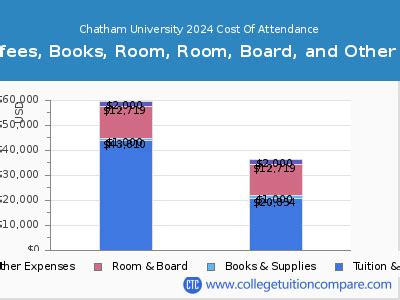Chatham University, a prestigious private institution located in Pittsburgh, Pennsylvania, offers students a transformative educational experience. However, understanding the university’s tuition costs is crucial for prospective students and their families. This article provides a comprehensive guide to Chatham University tuition, including detailed cost breakdowns, financial aid options, and strategies for managing expenses.

Tuition and Fees
For the 2023-2024 academic year, Chatham University charges the following tuition and fees for full-time undergraduate students:
| Category | Tuition | Fees | Total |
|---|---|---|---|
| In-State | $42,150 | $2,150 | $44,300 |
| Out-of-State | $42,150 | $2,150 | $44,300 |
| International | $45,650 | $2,150 | $47,800 |
Students enrolled in the university’s graduate programs may incur different tuition costs based on their specific program of study. For up-to-date information on graduate tuition and fees, refer to the Chatham University website.
Additional Expenses
In addition to tuition and fees, students should budget for other expenses associated with attending Chatham University, including:
- Room and board: $13,650 (on-campus housing)
- Books and supplies: $1,200
- Transportation: $1,500
- Personal expenses: $2,000
The total estimated cost of attendance for full-time undergraduate students living on campus is $62,550 for the 2023-2024 academic year.
Financial Aid
Chatham University is committed to providing financial assistance to students who demonstrate financial need. The university offers a range of financial aid options, including:
- Scholarships: Merit-based scholarships awarded to students with exceptional academic achievements, leadership qualities, or other accomplishments.
- Grants: Need-based grants awarded to students who demonstrate financial need, as determined by the federal government’s Free Application for Federal Student Aid (FAFSA).
- Work-study: A program that allows students to earn money to help pay for their education by working on campus.
- Loans: Loans that students can borrow to help pay for their education.
Strategies for Managing Expenses
Managing the cost of attending Chatham University can be challenging, but there are several strategies students can employ to reduce expenses and make their education more affordable.
- Apply for financial aid: Complete the FAFSA each year to determine eligibility for financial assistance.
- Explore scholarship opportunities: Research and apply for scholarships from Chatham University, external organizations, and private donors.
- Consider part-time work-study: Participate in the work-study program to earn money while attending school.
- Live off-campus: Off-campus housing options may be more affordable than on-campus housing.
- Negotiate a payment plan: Contact the university’s financial aid office to discuss payment options that may reduce monthly expenses.
Why Chatham University Tuition Matters
The cost of attending Chatham University is a significant investment, but it is one that can pay off in the long run. Chatham University graduates enjoy a number of benefits, including:
- High earning potential: Graduates from Chatham University earn an average of $64,000 per year, which is higher than the national average for college graduates.
- Job placement success: The university’s career services center helps graduates secure employment in their chosen fields.
- Strong alumni network: Chatham University has a strong alumni network that provides graduates with resources and support throughout their careers.
Pros and Cons of Chatham University Tuition
Pros:
- High-quality education: Chatham University offers a rigorous academic experience that prepares students for success in their careers.
- Financial aid opportunities: The university provides a range of financial aid options to help students afford their education.
- Strong alumni network: Graduates from Chatham University benefit from a strong network of alumni who provide support and resources throughout their careers.
Cons:
- High tuition costs: The cost of attending Chatham University is higher than the national average for private universities.
- Limited graduate programs: The university offers a limited number of graduate programs compared to some other universities.
- Small campus: The campus is relatively small, which may not be ideal for students who prefer a larger university environment.
Conclusion
Understanding the cost of attending Chatham University is essential for prospective students and their families. The university’s tuition and fees are higher than the national average for private universities, but it offers a range of financial aid options to help students afford their education. Graduates from Chatham University enjoy a number of benefits, including high earning potential, job placement success, and a strong alumni network. However, prospective students should carefully consider the cost of attendance and weigh it against the university’s benefits before making a final decision.
